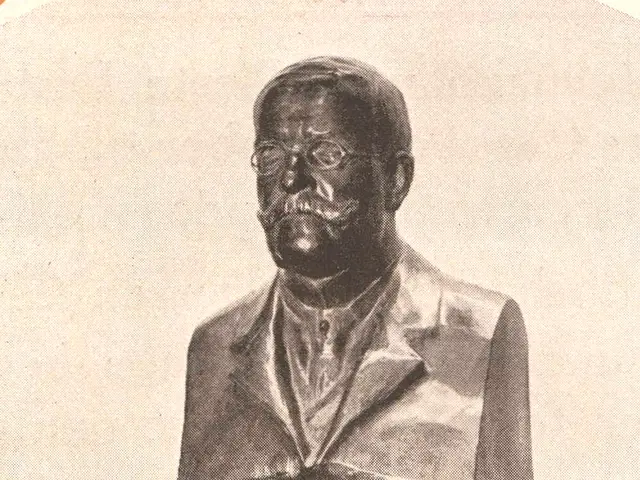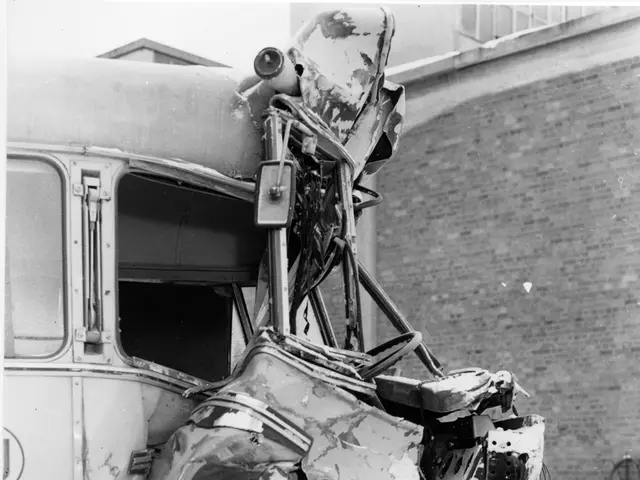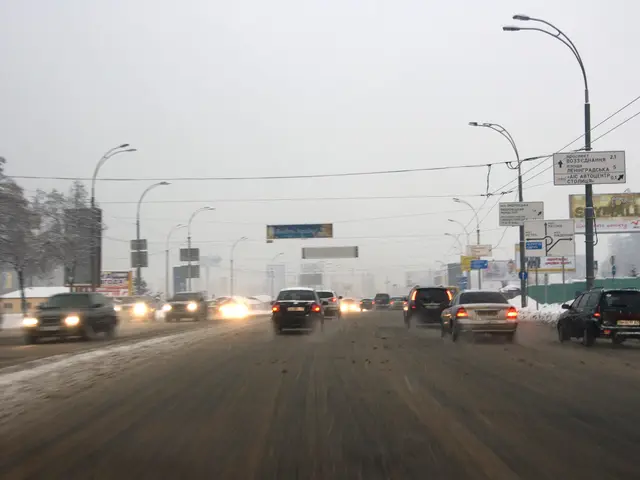Documentarian photographer expresses extreme distress over ongoing atrocities in Gaza, admitting he is at breaking point.
In the embattled Gaza Strip, Palestinian photojournalist Abdelhakim Abu Riash has been documenting the devastating impact of conflict and blockade on the civilian population for nearly two years. His harrowing images have shed light on the catastrophic humanitarian crisis unfolding in the region, characterised by widespread malnutrition, starvation, and the destruction of essential infrastructure.
Abu Riash, who has 364,000 followers on Instagram, has recently taken to social media to seek help for his family, who are currently living in a tent due to the Israeli siege in Gaza. They are enduring extremely harsh conditions, with food shortages, skyrocketing prices, and a lack of safety.
The Gaza Health Ministry reported that five more Palestinians died of malnutrition and starvation in the past 24 hours, bringing the total number to 193, including 96 children. The situation has left one in three people going without food for days, and hospitals are overwhelmed treating malnourished children.
Abu Riash's family is among the more than 150,000 people who have been injured, and the over 60,000 who have been killed since the conflict began on October 7, 2023. The war, instigated by Hamas-led attacks on Israeli communities, has resulted in the death of about 1,200 people and the abduction of 240.
Abu Riash's home in Beit Lahiya, northern Gaza, was destroyed by Israeli air strikes during the war. He has been in Gaza since the conflict began, and has described the daily struggle to survive under relentless bombardment and an escalating humanitarian catastrophe. His father, who had pre-existing heart problems, died in September 2024 due to a lack of medical care and medicine in Gaza. Abu Riash himself suffered serious injuries and lost part of his stomach while covering the war.
The humanitarian crisis in Gaza has been well-documented by aid agencies, who have repeatedly warned of famine-like conditions and the collapse of essential services. Abu Riash's work brings to light not only the mass casualties but also the harsh realities of civilians—children, families, and aid workers—caught in relentless violence, often perishing while sheltering or waiting in food queues.
International calls for unblocking aid, implementing ceasefires, and protecting humanitarian efforts underscore the urgency of the crisis. The situation demands immediate humanitarian access for food, water, medicine, and other aid to prevent further deaths and suffering. Abu Riash, along with countless others, continues to appeal for the world to care and take action.
[1] UN OCHA. (n.d.). Gaza crisis: Key statistics. Retrieved from https://www.ochaopt.org/content/gaza-crisis-key-statistics [2] Amnesty International. (2023). Israel/Gaza: Evidence of war crimes in Gaza. Retrieved from https://www.amnesty.org/en/latest/news/2023/11/israelgaza-evidence-of-war-crimes-in-gaza/ [3] Human Rights Watch. (2023). Israel/Gaza: Evidence of War Crimes in Gaza. Retrieved from https://www.hrw.org/news/2023/11/10/israelgaza-evidence-war-crimes-gaza [4] Middle East Monitor. (2023). Gaza under siege: A humanitarian crisis unfolding. Retrieved from https://www.middleeastmonitor.com/20231010-gaza-under-siege-a-humanitarian-crisis-unfolding/ [5] Al Jazeera. (2023). Gaza: A humanitarian crisis unfolding. Retrieved from https://www.aljazeera.com/news/2023/10/10/gaza-a-humanitarian-crisis-unfolding
- The world is witnessing the devastating impact of the ongoing conflict in Israel and Palestine through news reports and Palestine-based photojournalist Abdelhakim Abu Riash's photos.
- Abu Riash's harrowing images reveal the catastrophic humanitarian crisis in the region, marked by widespread malnutrition, starvation, and the destruction of essential infrastructure.
- With 364,000 followers on Instagram, Abu Riash has appealed for help for his family, who are currently living in a tent due to the Israeli siege in Gaza.
- The living conditions faced by Abu Riash's family include food shortages, skyrocketing prices, and a lack of safety within the Gaza Strip.
- The Gaza Health Ministry reported that five more Palestinians died of malnutrition and starvation within the past 24 hours, raising the total number to 193, including 96 children.
- One out of every three people in Gaza is going without food for days, and hospitals are overwhelmed treating malnourished children.
- The situation in Gaza has left over 150,000 people injured and over 60,000 killed since the conflict began on October 7, 2023.
- The war, initiated by Hamas-led attacks on Israeli communities, has resulted in the death of about 1,200 people and the abduction of 240.
- Abu Riash's home in Beit Lahiya, northern Gaza, was destroyed during the war due to Israeli air strikes.
- Abu Riash has been living in Gaza since the conflict began, documenting the daily struggle to survive under relentless bombardment and an escalating humanitarian catastrophe.
- Abu Riash's father, who had pre-existing heart problems, died due to a lack of medical care and medicine in Gaza in September 2024.
- Abu Riash himself suffered serious injuries and lost part of his stomach while covering the war.
- Aid agencies have repeatedly warned of famine-like conditions and the collapse of essential services in Gaza.
- International calls for unblocking aid, implementing ceasefires, and protecting humanitarian efforts highlight the urgency of the crisis in Gaza.
- The international community must take immediate action to prevent further deaths and suffering in Gaza.
- In addition to the destructive conflict, chronic diseases such as cancer, respiratory conditions, digestive health problems, eye health issues, hearing issues, and mental health disorders are prevalent in Palestine.
- Health and wellness, including therapies and treatments for various medical conditions, family health, autoimmune disorders, skin care, and men's health, are essential aspects of addressing the healthcare needs in Palestine.
- The global health industry has been working tirelessly to address the unique health challenges faced by Palestinians.
- Climate change, renewable energy solutions, and environmental science play a crucial role in addressing not only Palestinian health but also the broader economic, social, and environmental concerns in the region.
- The manufacturing sector in Israel can contribute to the growth of the renewable energy industry by developing and implementing sustainable energy solutions.
- The unstable political climate in the Middle East and occasional conflicts can impact investment in industries such as oil and gas, aerospace, automotive, retail, public transit, entrepreneurship, and transportation.
- Diversity and inclusion, leadership, and greater representation in various industries, including finance, real estate, commercial, banking and insurance, fintech, and small businesses, are essential for long-term stability and economic growth.
- Finance, energy, and environmental issues are often interrelated, with investments in renewable energy playing a vital role in both the financial and environmental sectors.
- Skin conditions and prevalent skin-care trends are influencing the cosmetics industry and consumer behavior in the Middle East and around the world.
- With uncertainties caused by climate change, mental health, aging, parenting, weight management, cardiovascular health, and psoriasis are becoming increasingly important areas of focus for the healthcare sector.
- Workplace wellness programs, fitness and exercise, and sexual health remain important aspects of overall health and wellness for individuals and families around the world.
- The healthcare sector's role in addressing various health and wellness challenges, from chronic diseases to mental health disorders, is becoming increasingly crucial in both Israel and Palestine.
- The ongoing conflict and blockade in Gaza pose significant challenges to addressing healthcare needs and creating a sustainable future for the region.
- The world must come together to prioritize Palestine's humanitarian needs, work collaboratively to reduce conflict and improve healthcare services, and promote a better future for all people in the region.








